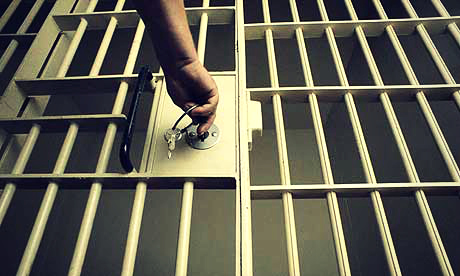By Chris Reed.
The same coalition of Democratic lawmakers and interest groups that worked with Gov. Jerry Brown on Propositions 47and 57 — which lessen the amount of time convicts must spend behind bars for relatively minor crimes and make it easier for convicts to gain parole, respectively — have a new target: the state’s harsh bail laws.
Brown has yet to sign on to the campaign led by state Sen. Bob Hertzberg, D-Van Nuys, and Assemblyman Rob Bonta, D-Oakland. But given that Hertzberg and Bonta’s main arguments have echoes of the arguments made on behalf of Propositions 47 and 57, it may be just a matter of time.
They are highly critical of California’s bail laws, which require suspects to post an average bail of $50,000 — more than five times the national median — before they can be released. In a state with the nation’s highest rate of poverty, these rules are so punitive that they routinely ruin suspects’ lives, Hertzberg and Bonta contend. Unable to afford bail, suspects languish in local jails until their trials start, losing their jobs and their ability to take care of their families, who sometimes lose their housing as a result — even if the suspects are never convicted of crimes.
Hertzberg says he’s finding GOP support for his interest in lowering bail rates. Perhaps his best tool in swaying tough-on-crime Republicans is the evidence that states with much lower, less punitive bail amounts do not have any trouble getting criminal suspects to come to their trials. If California adopted reforms and “risk-assessment” evaluations of the sorts used in Kentucky and New Jersey, Golden State taxpayers could save hundreds of millions of dollars.
A Public Policy Institute of California study backs up these theories. According to the PPIC, in 2014, 50,000 of the 80,000 people held daily in local jails in the state were there because they couldn’t make bail. A key PPIC conclusion: “California’s high rates of pretrial detention have not been associated with lower rates of failure to appear or lower levels of felony rearrests.”
Bail bond industry has fended off previous reform pushes
Given the heavy costs of incarceration, excessive and unnecessary bail would seem to have been low-hanging fruit both for criminal justice reformers and opponents of government waste during the budget wars seen during California’s revenue recession from 2008-2012. But the bail bond industry — with annual state revenue of $2 billion — has fought off reform with heavy lobbying, campaign donations and warnings of the risk to public safety if bail laws are weakened.
This could change in the 2017 session. “Now you have a whole host of groups on both sides of the aisle looking at the cost and fairness of the system,” Hertzberg told the Los Angeles Times.
There is also the possibility that changes in California bail laws could be demanded by state judges. The Equal Justice Under Law group is suing the cities of San Francisco and Sacramento over what the group calls unconstitutional bail policies that create two separate and unequal types of justice systems — a reasonable one for middle-income and wealthy families and a brutally harsh one for poor people.
At a state insurance commission hearing last month, state Insurance Commissioner Dave Jones praised Equal Justice Under Law for raising the issue.
“We shouldn’t have a system where your detention is based on your income. There are allegations that that’s the system we have,” Jones said, according to San Francisco TV station KPIX-5.
[divider] [/divider]





